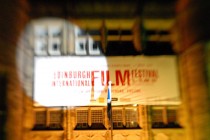9am is way too early in the morning to be sat in a cinema watching a film. I guess the projectionist thought so too, because twenty minutes after The Runaways was supposed to start, we were still being treated to snippets of sound and impressionistic snatches of light spattered across the Cineworld multiplex screen. As I clutched onto my latte for dear life, I began to wonder if we were being secretly filmed, or indoctrinated with sleeper instructions for some nefarious agenda. The micro-environment around me seemed to take on foreboding, Logans Run-esque overtones. Is there life outside the Cineworld? Just who is in charge of the Coffee Republic, and why can’t they make coffee?
Last year’s Coraline aside, I’ve somehow managed to miss Dakota Fanning since War of the Worlds, five years ago. Similarly, Kristen Stewart last came to my attention as Jodie Foster’s daughter in 2002′s Panic Room. Both have since been involved in some kind of franchise involving sparkly vampires, which I have to confess I’ve avoided as if it was a direct puncture threat to my own jugular. My admittedly ill-informed prejudice is that, in the Twilight universe, “alternative” has been sanitised and packaged for the mainstream.
Given this gap, it’s fair to say that Stewart and Fanning have changed since I last saw them: Charlotte’s Web this is not. Indeed, ideally I would have liked a second coffee before watching Dakota Fanning strut around in her lingerie. It broke my brain and made me feel as old as dust.
My cognitive sluggishness aside, The Runaways is a perfect antidote to the alienation and loss we’ve seen so much of at this year’s film festival. It’s a film about what comes next: empowerment and seizing control of your own identity. From the gloopy menstrual opening shot, it stakes its territory as a punk-inspired fireball that aims to capture the energy – and the fallout – of Joan Jett and the Runaways’ seventies heyday.
In tone, it’s most similar to Drew Barrymore’s recent directorial debut Whip It. However, there is more gravitas here, largely due to the tragedy of Cherie Currie’s life (the film was based on her autobiography, Neon Angel). Both Stewart and Fanning deliver surprisingly nuanced, powerful performances: this is an opportunity for them to make a statement of intent, and they’ve grabbed it with both hands.
Unfortunately, despite the obvious talent of its actors, it’s not a five-star film. The Runaways’ true-life background occasionally trips it into the biopic trap of namechecking characters and events even if they don’t further the story – much of the cast is underused, and it would have been nice to see more of the wider context of working class Los Angeles in the 1970s.
Although the theme of empowerment and liberation looms large, I found myself questioning quite why the actors spend so much of the duration in their underwear. There’s a subtheme about the exploitation and objectification furthered by the band’s producer (Kim Fowley, effectively portrayed as an unsettling creep by Michael Shannon), and I have to wonder if this wasn’t also happening, at least a little bit, during the production of the film: it, like the Runaways themselves, is a product being sold on the sex appeal of its stars.
Overall, though, The Runaways is powerful medication for a world that needs more genuine rebellion. I hope the Twilight set go out to see it in droves.














Comments